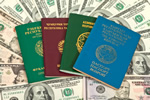Coping with financial matters as a newly arrived expat

Coping with financial matters as a newly arrived expat
One of the major headaches of emigration is getting to grips with a foreign currency and your new country’s financial rules, regulations and bureaucracy. For most expats, financial matters in the home country are often confusing at best and mysterious at worst, but adding in currency exchange rates, unfamiliar banking laws, instructions in the local language and seemingly illogical banking systems is every expat’s worst nightmare. Unfortunately, it’s a nightmare which has to be faced.
The first essential is to remember to tell your home country bank you’re leaving, even if you wish to continue using their services from overseas. This may seem simple, but many UK banks in particular are now refusing to allow expats to keep their accounts. If this happens, the easiest way out is to use an offshore bank in a jurisdiction such as the Isle of Man. If your UK bank will allow you to keep your account, give them an alternative UK address for communications as well as your new overseas address. Getting a foreign exchange fee-free credit card will save you money, with most banks providing this service.
Downloading a currency conversion app will help you stick to your budget unless you’re a whiz at mental arithmetic, at least until you’re totally familiar with your new currency and don’t need to know the sterling equivalents. Researching set-up arrangements for a local bank account should be done before you leave, with almost every country treating expats differently. Once this is done, figuring out how to transfer from your home country account is the first job, just in case you need extra funds in a hurry. Banks give dreadful exchange rates, meaning you’ll need to hook up with an online currency exchange website in order to get the best rates and the lowest charges. Usage is straightforward once you’re used to the format.
It’s a good idea to arrive in your new country with cash in hand, as it makes dealing with unexpected costs far easier. Also, stashing some funds in an account you can’t easily access can help if and when you have sudden emergency needs, with a savings account based in your home country’s bank the best option. If you’ll be working in your new country, getting to grips with its tax laws or employing a local to do it for you is essential in order to ensure you’re paying the right amount at the right time. Finally, saving for your eventual retirement is a good habit, albeit boring when there are so many other exciting calls on your spare cash. Years later, you’ll be glad you did.
Related Stories:
- Is Kuwaitization the unintended result of the oil price crash? - July 20, 2020
- Expats in Malaysia still banned from overseas travel - July 17, 2020
- HSBC Asia to cut back on internal expat relocations - July 16, 2020
- Tips on integrating for newly-arrived expats - July 15, 2020
Latest News:
- Tips on a trouble-free relocation as an expat overseas - July 20, 2020
- Expats find peace in the covid-19 refuge of Dahab town - July 20, 2020
- Is Kuwaitization the unintended result of the oil price crash? - July 20, 2020
- Expats unhappy abut changes to Korean points-based visa system - July 17, 2020
- Chiang Mai and Bangkok no longer bargain locations for expats - July 17, 2020
- Expats in Malaysia still banned from overseas travel - July 17, 2020
- Vietnam welcomes expats to its safe, affordable lifestyle - July 16, 2020
- Asian tiger economies reach out to expats in Hong Kong - July 16, 2020
- HSBC Asia to cut back on internal expat relocations - July 16, 2020
- Tips on integrating for newly-arrived expats - July 15, 2020


